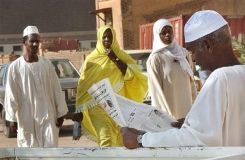Khartoum press hails Sudan peace deal, hopes for new era of freedom
KHARTOUM, Jan 10 (AFP) — The Khartoum press hailed Sunday’s landmark peace deal ending more than two decades of civil war in southern Sudan and expressed hope it would usher in a new era of freedom 16 years after President Omar al-Beshir seized power in a military coup.
 “The Sudanese people say goodbye to 20 years of fighting and greet peace,” ran the banner headline in the independent Al-Adhwaa daily.
“The Sudanese people say goodbye to 20 years of fighting and greet peace,” ran the banner headline in the independent Al-Adhwaa daily.
“At last the peace dream has become a reality,” trumpeted its independent rival Al-Rai Al-Aam.
All the papers made much of the rare international spotlight on Sudan, which saw US Secretary of State Colin Powell and other world leaders attend Sunday’s signing ceremony in Nairobi.
“The world witnesses the agreement of the Sudanese in the biggest ever international celebration”, thundered the state-owned Al-Anbaa newspaper.
But some papers cautioned that the international attention needed to be followed by concrete aid for post-war reconstruction.
“We look forward to a sustained international solidarity with the Sudan by removing the traces of the war, rehabilitation and resettling the refugees and displaced,” Al-Rai Al-Aam said in an editorial.
The UN High Commissioner for Refugees estimates that three and a half million out of southern Sudan’s 10 million people have been displaced by the war, 500,000 of them beyond Sudan’s borders.
Last year, the agency’s assistant high commissioner, Kamel Morjane, launched an appeal for 90 million dollars from UN member states to fund an initial two-year repatriation programme.
Sudan’s oldest independent daily, Al-Ayam, carried an outspoken back-page editorial calling for an end to the “totalitarianism” of the Beshir regime.
“Yesterday was a great day after which we will not accept other than a new Sudan built on the ruins of the totalitarianism that began in June 1989,” the paper’s columnist Murtadha al-Ghali wrote.
He said the participation of the southern rebels in a new power-sharing government would mark “a radical change” in Sudanese politics.
The provisions of the peace deal signed in Nairobi would force an end to the centralization of power in Khartoum and the lifting of the longstanding state of emergency under which hundreds of dissidents have been detained without charge, he said.
“This is the new reality and every Sudanese should be aware of it — the clock of freedom and justice has rung.”
In the past, such outspoken commentaries have got the newspaper into deep water with the authorities.
In November 2003, the government suspended Al-Ayam’s licence for three months, sparking protests from the US embassy here.
Beshir’s government banned all political parties after seizing power in 1989 and still enforces a state of emergency under which Islamist leader Hassan al-Turabi and dozens of members of his Popular Congress party remain in jail.
Under Sunday’s peace agreement, the government is required to allocate 28 percent of posts to the rebel Sudan People’s Liberation Movement, six percent to other southern factions and 16 percent to other northern parties.
One of Sudan’s oldest political factions, the Democratic Unionist Party, reopened its Khartoum offices last week for the first time in 15 years but has said it will not take part in the new government.
